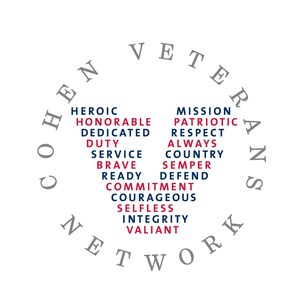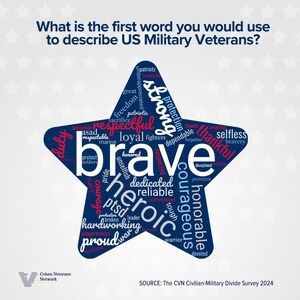CVN Survey: Nearly one-third (29%) of Americans believe asking someone if they are thinking about taking their own life may make them more likely to kill themselves
STAMFORD, Conn., Sept. 8, 2022 /PRNewswire/ -- Veteran suicide is a complex issue. There is no single cause or solution. However, there are steps that can be taken to further suicide prevention efforts. As September marks Suicide Prevention Awareness Month, Cohen Veterans Network (CVN), a not-for-profit philanthropic organization that serves post-9/11 veterans, service members and their families through a nationwide system of mental health clinics, is calling on all Americans to step up against veteran suicide by learning the warning signs of someone at risk, understanding what to say and do in support of someone who may be struggling and knowing the resources available for those experiencing a mental health crisis. The network has developed a webpage dedicated to these actions that anyone can utilize in support of suicide prevention.
In 2019, the veteran suicide rate was 31.6 per 100,000, nearly twice the rate of non-veteran US adults (16.8 per 100,000), according to the U.S. Department of Veterans Affairs' 2021 National Veteran Suicide Prevention Annual Report. The report also found that in 2019 there was an average of 17.2 veteran suicides per day. That equates to 6,261 veteran suicide deaths in 2019, 399 fewer than in 2018.
"We owe it to our nation's veterans to do all that we can in support of their mental health and well-being," said Cohen Veterans Network President and CEO Dr. Anthony Hassan. "That includes being proactive when it comes to suicide prevention: become familiar with suicide warning signs, learn what to do and how to approach a loved one that you might be concerned about, and familiarize yourself with the resources available to help manage a crisis scenario. These small steps could have a considerable impact on a veteran's life."
CVN's call to action comes after the organization revealed findings from its America's Mental Health Suicide Prevention Pulse Survey last year. The survey, which looked at Americans' general knowledge of suicide prevention, discovered a number of strong misconceptions about the topic. Among its key findings:
- Nearly half (45%) of Americans believe that most suicides happen suddenly, without warning or ''on a whim.''
- FACT: Most people who attempt to kill themselves will display warning signs. Recognizing the signs could help prevent suicide. Warning signs include, talking about wanting to die or wanting to kill themselves, withdrawing from family and friends, giving away important possessions, putting affairs in order, such as making a will and more.
- Nearly one-third (29%) of Americans believe asking someone if they are thinking about taking their own life may make them more likely to kill themselves.
- FACT: Talking about suicide can provide relief to someone experiencing suicidal thoughts knowing that someone cares, wants to listen, and is there to help. "Asking about suicidal thoughts or feelings won't push someone into doing something self-destructive. In fact, offering an opportunity to talk about feelings may reduce the risk of acting on suicidal feelings," according to the Mayo Clinic.
"Early intervention is critically important when it comes to suicide prevention," said Hassan. "That's why access to care remains a top priority of Cohen Veterans Network. When a military community member raises their hand asking for support, our Cohen Clinics are ready to help."
Since its inception in April 2016, CVN has provided mental health services to over 42,000 clients. Care is available to post-9/11 veterans, service members and military family members through the network's 22 Steven A. Cohen Military Family Clinics across the country. Clients are treated for a wide variety of mental health challenges including PTSD, depression, anxiety, adjustment issues, anger, grief and loss, family issues, transition challenges, relationship problems, and children's behavioral problems. Treatment is available in person or via CVN Telehealth, face-to-face video therapy.
For more on how to step up against veteran suicide, log onto cohenveteransnetwork.org/suicideprevention.
Cohen Veterans Network is committed to increasing access to mental health care services. America's Mental Health Suicide Prevention Pulse Survey was conducted by The Harris Poll on behalf of Cohen Veterans Network and included 2,063 American adults aged 18 or older who participated in an online survey between August 17 - 19, 2021. Results were weighted to Census targets for education, age/gender, race/ethnicity, region, household income, and propensity to be online were adjusted where necessary to bring them in line with their actual proportions in the population.
Cohen Veterans Network (CVN) is a 501(c)(3) national not-for-profit philanthropic organization for post-9/11 veterans, active duty service members and their families. CVN focuses on improving mental health outcomes, operating a network of outpatient mental health clinics in high-need communities, in which trained clinicians deliver holistic evidence-based care to treat mental health conditions. It was established in 2016 by philanthropist Steven A. Cohen with a commitment of $275 million to build the network. Learn more.
SOURCE Cohen Veterans Network

WANT YOUR COMPANY'S NEWS FEATURED ON PRNEWSWIRE.COM?
Newsrooms &
Influencers
Digital Media
Outlets
Journalists
Opted In






Share this article